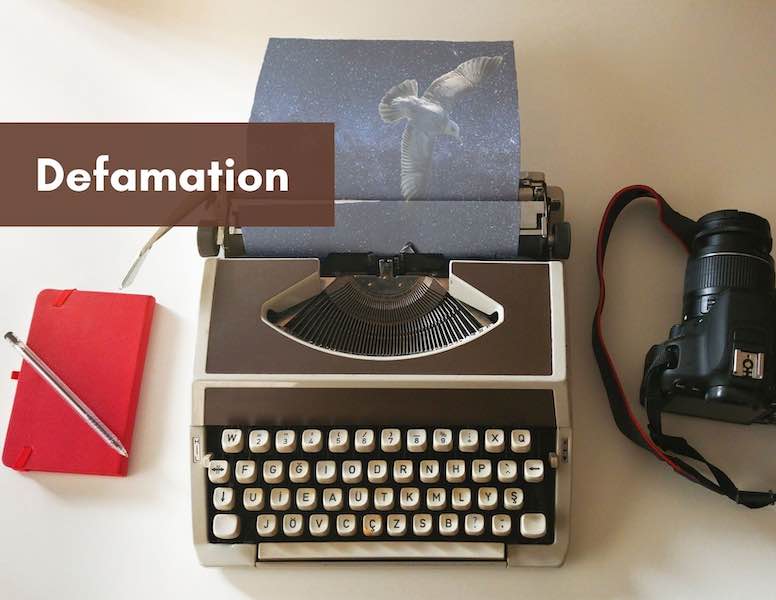Defamation: The Media Defences of Reynolds’ Privilege and Neutral Reportage
by Alliff Benjamin Suhaimi & Phoebe Loi Yean Wei ~ 1 December 2020


Alliff Benjamin Suhaimi (Partner)
Phoebe Loi Yean Wei (Associate)
Introduction
Defamation law is a constant balancing between a person’s right to not be defamed against the other person’s right to freedom of speech. In Malaysia, the right to freedom of speech is enshrined under Article 10 (1)(a) of the Federal Constitution, which states as follows:-
- Subject to Clauses (2), (3) and (4) –
- every citizen has the right to freedom of speech and expression;
Right to Freedom of Speech v Right to Reputation
Indeed, every individual has the right to freedom of speech, and it is important that this right is upheld and protected for obvious reasons. However, it is also obvious that the right to freedom of speech can, and has been, blatantly abused by many. With the advent of technology and social media, the abuse of this right only increases each day. Which is why it is paramount for there to be laws to maintain the balance between freedom of speech and a person’s right to their reputation. This too, is stated clearly in the Federal Constitution under Article 10(2)(a):
- Parliament may by law impose –
- on the rights conferred by paragraph (a) of Clause (1) [freedom of speech], such restrictions as it deems necessary or expedient……to provide against contempt of court, defamation, or incitement to any offence;
The importance of maintaining a proper balance between the competing rights was highlighted by the Federal Court in Ling Wah Press (M) Sdn Bhd & Ors v Tan Sri Dato Vincent Tan Chee Yioun [2000] 4 MLJ 77:
"…We are of the view that freedom of speech is not an absolute right. Freedom of speech is not a licence to defame people. It is subject to legal restrictions. An absolute or unrestricted right to free speech would result in persons recklessly maligning others with impunity, and the exercise of such right would do the public more harm than good. Every person has a right to reputation and that right ought to be protected by law……Article 10 of the Federal Constitution itself while guaranteeing every citizen the right to freedom of speech and expression has imposed restrictions by authorizing Parliament to enact laws which it deems necessary to provide against contempt of court, defamation or incitement to any offence.”
Clearly, the right to freedom of speech is not absolute. The Federal Constitution provides parliament with the powers to enact laws to protect one against defamation. As such, when a person is unsure whether the content being published is true or not, he should not be quick to publish it, unless and until it has been verified. However, such option may not be available to journalists and the media.
There are situations and circumstances which warrants certain contents to be published quickly. These would usually be matters of public interests published by the media. In such circumstances, the law recognises that at times, by reason of the role that is played by the media in disseminating information for the public good, it should be accorded special defences. This is a necessary check and balance, especially in our world today where news reporting on the internet and social media has become a norm.
The Media Defences
The defences of Reynolds’ Privilege (commonly referred to as responsible journalism) and Neutral Reportage, although known as the media defences, are not strictly available to media defendants only. They are in fact available to anyone who publishes contents on matters of public interest.
As to the meaning of ‘Public Interest’, guidance can be sought from the case of Sivabalan a/I P Asapathy v The New Straits Times Press (M) Bhd [2010] 9 MLJ 320, where the court said:
“A matter is said to be of 'public interest' if the public had an interest in matter, as opposed merely to being interested in matters. Being interested in matter would refer to matters which were merely titillating or salacious or gossipy. Matters which were of public interest, on the other hand included those which affect the public in terms of governance of their country, their safety, security and right to judge public representatives fairly on the basic of real information.”
i. Reynolds’ Privilege
In the past, the courts have consistently refused to recognise a general interest and duty on the part of the media to report matters to the public at large. However, this changed with the House of Lord’s decision in Reynold’s v Times Newspapers Ltd [2001] 2 AC 127.
Mr Reynolds had been the Prime Minister of Ireland until a political crisis struck in 1994. He began proceedings for defamation against the Times, the publisher of an article contained in the British mainland edition of a national newspaper. The article alleged that Mr Reynolds had misled the Irish Parliament. It was claimed that the words complained of bore the meaning that he had deliberately and dishonestly misled the Parliament and his cabinet colleagues. The Times pleaded, amongst others, the defence of qualified privilege at common law.
The House of Lords declined to recognise a new category of qualified privilege for the dissemination of political information but agreed that the defence should be extended. Qualified privilege is a defence that applies in a situation where the words have been published:
- by a person ‘who has an interest or a duty, legal, social, or moral, to publish the words to the person(s) to whom they were published’; and
- the person(s) to whom the words were published ‘had a corresponding interest or duty to receive them’.
It was contended by The Times that courts should recognise a generic qualified privilege encompassing the publication by a newspaper of political matters affecting the people of the United Kingdom. This was rejected by the House of Lords and it was held that common law should not develop a new category of qualified privilege whereby the publication of all political information would attract qualified privilege whatever the circumstances, since that would fail to provide adequate protection for reputation. Further, it would be unsound in principle to distinguish political information from other matters of public concern.
However, it was agreed that the traditional ambit of qualified privilege should be extended and the House of Lords looked at the issues of: freedom of expression, the role of the media in disseminating important information and the rights of an individual to protect their reputation. Having balanced these competing interests, the Court proposed some ‘leeway’ in respect of the duty-interest concept of qualified privilege to give some protection to the media in cases where there is ‘responsible journalism’ and also where the information published to the public was important.
To succeed in establishing Reynold’s Privilege as a defence, two requirements must be satisfied:
- The publication must be on a matter of public interest; and
- The steps taken to gather, verify and publish the information must be responsible and fair (ie. responsible journalism).
On the second requirement of Reynolds’ Privilege, Lord Nicholls set out ten indicative and non-exhaustive factors as a guide to determine whether there has been responsible journalism:
- The seriousness of the allegation – the more serious the charge, the more the public is misinformed and the individual harmed if the allegation is not true.
- The nature of the information, and the extent to which the subject matter is a matter of public concern.
- The source of the information – some informants actually do not have direct knowledge of the events, whereas some informants have their own axes to grind, or are being paid for their stories.
- The steps taken to verify the information.
- The status of the information. The allegation may have already been the subject of an investigation, which commands respect.
- The urgency of the matter – news is often a perishable commodity (breaking news – often needs to be published as soon as possible).
- Whether comment was sought from the plaintiff – he may have information others do not possess or have not disclosed. However, an approach to the plaintiff isn’t always necessary.
- Whether the article contained the gist of the plaintiff’s side of the story.
- The tone of the article – a newspaper can raise queries or call for an investigation. But it does not have to adopt allegations as statements of fact.
- The circumstances of the publication, including the timing.
The above decision in Reynolds’ was affirmed in another House of Lords case – Jameel v Wall Street Journal Europe Sprl [2007] 1 AC 359. Here, the rationale of the responsible journalism test was explained:
“… the rationale of this test is, as I understand, that there is no duty to publish and the public have no interest to read material which the publisher has not taken reasonable steps to verify … But the publisher is protected if he has taken such steps as a responsible journalist would take to try and ensure that what is published is accurate and fit for publication.” – Lord Bingham of Cornhill
Application of Reynolds’ Privilege in Malaysia
Reynolds’ Privilege is applicable in Malaysia and available to defendants in defamation suits where the impugned statements concerns matters of public interest. This can be seen in the Federal Court decision of Syarikat Bekalan Air Selangor Sdn Bhd v Tony Pua Kiam Wee [2015] 6 MLJ 187.
In this case, the questions before the Federal Court included: (i) whether Reynolds’ Privilege would apply to an individual who is not a journalist; and (ii) whether a defendant needs to show that responsible and fair steps were taken to gather, verify and publish information, or whether it is sufficient to merely have an honest belief that the statements were true, even if the statements were in fact untrue?
The Federal Court held that Reynolds’ Privilege is available to an individual who is not a journalist as this is a defence of public interest, given that it concerns the publication of material or information which are of public importance. As such, the defence should be extended to anyone who publishes material of public interest. The Federal Court further held that a defendant who relies on Reynolds’ Privilege must show that the publication was made responsibly. In this case, Tony Pua omitted to publish SYABAS’s side of the story which he has knowledge of. It was held that the failure to disclose this information in the publication is against the concept of responsible journalism. Consequently, he was not allowed to rely on Reynolds’ Privilege.
Although Tony Pua failed to establish Reynolds’ Privilege, he was successful in establishing another defence (justification), resulting in the appeal being dismissed in his favour. To know more about this case, please see the article written by the firm’s Partner, Alliff Benjamin Suhaimi, who represented Tony Pua in this case. The article can be found here.
ii. Neutral Reportage
The defence of Neutral Reportage came about from the English Court of Appeal decision in Al-Fagih v HH Saudi Research & Marketing (UK) Ltd [2001] EWCA Civ 1634, where it was held that neutral reporting without adopting or endorsing the report is protected as long as both sides of the dispute have been fairly reported in a disinterested manner by a newspaper. This defence has also been recognised by our courts in Dato’ Seri Anwar bin Ibrahim v The New Straits Times Press (M) Sdn Bhd & Anor [2010] 2 MLJ 492 (“Anwar v NSTP”).
Anwar v NSTP was referred by the Court of Appeal in Raub Australian Gold Mining Sdn Bhd v Mkini Dotcom Sdn Bhd & Ors [2018] 4 MLJ 209 (“Raub v Mkini & Ors”), which held that, for a publication to be protected by reportage, ‘the report, judging the thrust of it as a whole, and viewed objectively, must have the effect of reporting not the truth of the statements, but the fact that they were made’.
Raub Australian Gold Mining Sdn Bhd (Appellant) had sued Mkini Dotcom Sdn Bhd and others (Respondents) for defamation and malicious falsehood over three articles and two videos that were published in the online news portal, Malaysiakini. It was alleged that the mining company’s use of cyanide in carrying out gold mining operations near a village in Pahang, had adversely affected the health of the nearby villagers, decimated wildlife and vegetation in their area and polluted the environment.
The claim was dismissed as the High Court found that the defamatory publication concerned a matter of public interest and the Respondents had successfully raised the defences of responsible journalism and reportage. The mining company appealed.
In dealing with the defence of responsible journalism, the Court of Appeal found that the Respondents had not acted fairly and responsibly as they failed to meet the relevant ten-point test set out in Reynolds. The Court found that for one of the articles, apart from seeking confirmation from the residents affected through the chairman of the village committee, the verification stopped there. The Court also found that the Respondents made no attempts or efforts to contact other experts on the matter or to contact Appellant to get its side of the story.
It was further held that the article made very serious allegations against the Appellant and its tone was extremely accusatory and damaging. In light of the seriousness of the allegations, responsible journalism warranted a fair and balanced reporting where the Appellant should have been given an opportunity to answer the accusations.
With regards to the defence of neutral reportage, the Court found that the Respondents failed to establish this defence as:
- Only one version of one side of the dispute was reported;
- No attempts were made to contact any independent bodies such as the Department of Environment, the Department of Minerals and Geoscience or the Ministry of Health prior to publication of the articles and videos to show that the Respondents were neutral and not taking sides – this is in light of the fact that the allegations were extremely serious and damaging and may lead to criminal prosecutions and civil suits being brought against the Appellant if the allegations were true;
- There was a cavalier and reckless attitude on the part of the Respondents;
- There was a press statement issued by the Ministry of Health that refuted the allegations, and an admission by one of the accusers that cyanide was not the cause of the villager’s ill health. In such circumstances, the Respondents should have contacted the Appellant to get its response and side of the story to maintain a balanced reporting;
- The tone of the third article was extremely accusatory and was not neutral. It was also unbalanced and unfair as it did not carry both versions to the dispute.
Another crucial point to note is that the Court of Appeal also held that the defences of Reynolds’ Privilege (responsible journalism) and neutral reportage are separate and distinct defences, which requires them to be pleaded separately.
The defences have also been said to be mutually exclusive and incompatible with one another as once defence of reportage is relied on, it is ‘forensically problematical to fall back upon an alternative defence of responsible journalism’. In the case of reportage, there is complete neutrality which infers a state of mind and intent whereas in responsible journalism, a view may be justifiably proffered. Hence, the Court took the view that a defendant must decide which is to be pleaded, reportage or responsible journalism at the time of finalising their pleadings. Pleading in the alternative does not work here.’ In other words, a defendant may only choose to either plead the defence of reportage or Reynold’s Privilege.
The Court of Appeal’s decision above which required a defendant to decide whether to plead either Reynolds’ Privilege or reportage has raised concerns among stakeholders, particularly media defendants, as it has always been the practice that defendants in defamation suits are allowed to plead all the defences which are available to them in the alternative.
To now restrict it so that only one or the other can be relied on, may affect the role of the media in disseminating information of public interest, bearing in mind that ‘news is a perishable commodity and to delay its publication, even for a short period, may well deprive it of all its value and interest’ (see Sunday Times v United Kingdom (No 2) (1991) 14 EHRR 229, 242, para 51). This issue is however not closed as the matter is now pending determination by the Federal Court.
Conclusion
Freedom of speech, albeit important, does not give a person the right to defame another. Prudent and reasonable steps ought to be taken to investigate and verify the accuracy of the material before publication. In light of the Court of Appeal’s decision in Raub v Mkini & Ors, media defendants should also take steps to ensure that the publication is made in a fair, disinterested and neutral way, or that there has been responsible journalism.
As to the issue of whether Reynolds’ Privilege and neutral reportage are mutually exclusive and incompatible with one another, it is our view that defendants should plead them in the alternative. We hope the Federal Court will provide some clarity on this point and reach a decision that serves to safeguard the interests of defendants who published matters of public interest.
